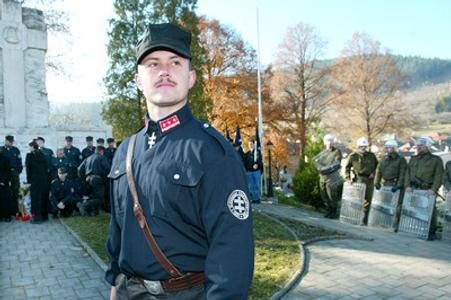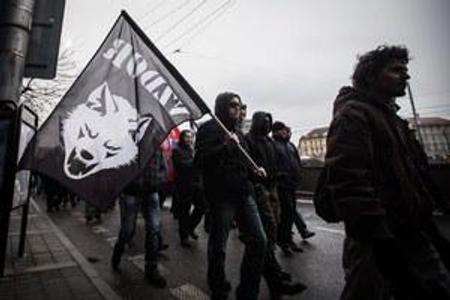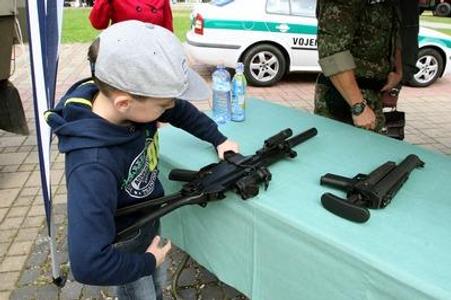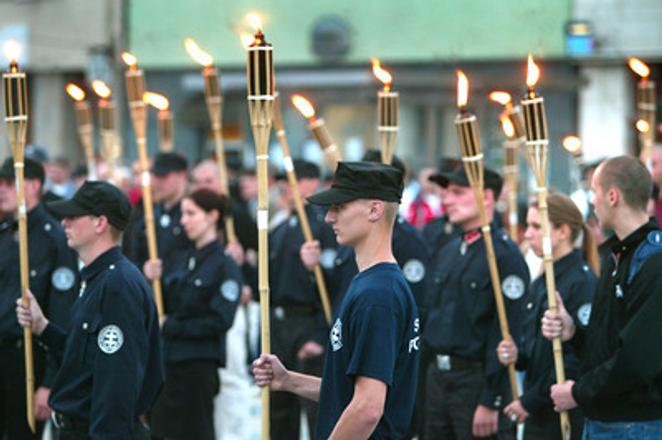The extremist People’s Party-Our Slovakia (ĽSNS) wants to use around €5 million in state subsidies it received as a parliamentary party for military training that could see marches by uniformed participants through Roma settlements.
The party reached 8 percent of votes in the March 5 general election, thus it automatically receives money for each vote and for every seat in parliament, leading to a grand total of €5.2 million.
Originally, the party promised its voters to refuse the money or give it to citizens. ĽSNS representatives later realised, however, that those options are not legally possible and therefore Kotleba told the press few days after elections that he wants to use it to build a militia protecting people in places where the police fail to do so.
“If the state will not intervene as it should after the founding of this party, it means the state has resigned from its main role – the protection of its citizens’ security,” Jarmila Lajčáková of the Centre for Research of Ethnicity and Culture (CVEK) told The Slovak Spectator.
Legislation does not allow anyone to create an official military or paramilitary armed organisation which would substitute for the work of the police corps without parliament approval. On the other hand, Kotleba’s units could be unarmed.

The law allows a parliament party to use money from the state for such purposes, according to Transparency International Slovakia head Gabriel Šípoš.
“They can do that as direct payment for security services to their people acting as self-employed people or to pay party personnel for that,” Šípoš told The Slovak Spectator.
ĽSNS is already personally connected to paramilitary extremist group Akčná skupina Vzdor, which conducts military training in Slovak forests.
Inspiration in Hungary
Kotleba could be inspired by the extremist Hungarian Guard. The guard’s members took an oath and then travelled to Roma settlements in Hungary wearing uniforms which created conflict situations, according to Slovak Interior Ministry expert on extremism, Daniel Milo.
“As it has been in many other issues, Kotleba is now trying to reproduce what our southern neighbours [Hungary] tried, meaning voluntary groups pretending to be security units,” Milo told The Slovak Spectator.
A Budapest court disbanded the Hungarian Guard in December 2008 for using racist slogans and pretending to be an official group protecting people -- a violation of the Hungarian Constitution. Members of the guard are well-known in Slovakia after they defamed the Slovak flag in front of the Slovak embassy in Budapest on November 1, 2008.
There are several groups who act as security service or militia in Europe. For example, Scandinavian countries deal with a group calling itself Soldiers of Odin, which has been patrolling in cities to protect locals from refugees.
“We will face a big problem if this is going to happen in Slovakia,” Jaroslav Naď of Slovak Security Policy Institute (SSPI) told The Slovak Spectator.
Money from the state
Reading the ĽSNS election program, it is not clear what function the militia should have. In order for a millitia to have the same powers as the police, parliament would have to change the law, said Interior Ministry spokeswoman Michaela Paulénová.
Theoretically, the party can buy equipment such as vehicles and uniforms or pay for training because legislation does not stipulate how parties can spend money from state.

“It is solely in ĽSNS’s representatives competences how the party spends the contribution for votes,” Paulénová told The Slovak Spectator.
The only limits are that a party cannot give those contributions as a gift, lend the money, do business with it, vouch for debts of others or use it to pay fines, according to legislation.
Previous tries
Kotleba had a militia in his program back in 2013 when he was running for governor of the Banská Bystrica self-governing region (BBSK). After he was elected to the post, he wanted to create municipal watches which would be funded by the BBSK, but it lacked the money. Moreover, BBSK citizens circulated a petition against such a militia because it would have to be paid from the municipalities’ coffers, according to Ingrid Kosová from WatchBBSK regional watchdog.
“Kotleba could get funds from Government’s Proxy for Roma Communities Peter Pollák for funding Roma patrols but he doesn’t want Roma participating in security issues,” Kosová told The Slovak Speectator.
People connected with the party were trying to create a paramilitary organisation which would have formed a citizen union in 2013. The union would have been named the People’s Guard.
Paramilitary groups get more active
Action Group Vzdor (Defiance) announced in 2015 that it wants to choose elite members who would be able substitute for the police and army in times of serious social crisis. The group is presenting itself in online videos as they practice shooting, endure teargas or use home-made flamethrower.
One of the leading personalities of the group is Marian Magát, known for his anti-democratic rhetoric and who is 88th on ĽSNS’s candidate list.

There are several such groups in Slovakia. After the March election, they have representatives in parliament which makes them feel more relevant and more secure, and are therefore more active, according to Naď.
“We have noticed mobilisation of those groups which are calling for people to join their training,” Naď said. “It results from increased popularity and self esteem related to the election success of Marian Kotleba.”
Professionals can train them
Based on previous experiences, it is very likely that Kotleba’s militia would be trained by professionals from the Slovak armed forces and police, according to Naď. He added that when he worked at the Defense Ministry during the government of Iveta Radičová (2010-2012), the ministry was investigating 10 to 20 soldiers yearly for supporting extremist groups.
“Surely professionals can train those people because in the army and police we already have supporters of Kotleba and even more radical groups,” Naď said. “Most of them keep it a secret but there are cases when they openly support them.”

He pointed out that professional soldier Michal Feling already trains paramilitary group the Slovenskí Branci and that Slovak authorities have allowed it. The Defence Ministry was considering his discharge but, ultimately, it only sent him to another position where he does not have access to tactical information.
The ministry explained for the public service RTVS that Slovak authorities have not officially banned the group. In fact, Slovenskí Brancias is not on the list of extremist organisations because the organisation does not officially exist.
“This shows the loophole in Slovak legislation,” Naď said. “This organisation really exists despite not having a legal form, therefore there has to be way to ban it.”



 (source: Sme)
(source: Sme)